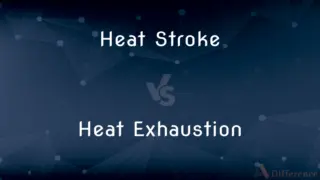Jet vs. Plane — What's the Difference?
Edited by Tayyaba Rehman — By Fiza Rafique — Published on March 3, 2024
Jets are aircraft powered by jet engines, offering high speed and altitude capabilities, whereas planes can include any type of aircraft, including jets, propeller-driven, and others, encompassing a broader category.

Difference Between Jet and Plane
Table of Contents
ADVERTISEMENT
Key Differences
Jets are defined by their propulsion system, utilizing jet engines that expel exhaust at high speeds to thrust the aircraft forward. This technology enables jets to fly at higher altitudes and speeds, making them ideal for long-distance and commercial air travel.
Planes, on the other hand, refer to a wider category of aircraft that includes any fixed-wing aircraft. This broader term encompasses jets, propeller planes, and other variations, making "plane" a more inclusive term in the world of aviation.
The speed and efficiency of jets are unmatched by most other types of planes, particularly propeller-driven aircraft, which are generally slower and cannot reach the same high altitudes as jets. However, propeller planes can be more cost-effective for short distances and require shorter runways, offering versatility in landing locations.
Jets are often associated with commercial airliners and military aircraft due to their speed and range capabilities, while planes as a broader category can serve a variety of purposes, including recreational, cargo transport, and agricultural uses, depending on their design and propulsion system.
Choosing between a jet and another type of plane depends on specific needs such as travel distance, budget, and the desired speed of travel. Jets offer rapid transit across long distances, while other planes might be more suited to short hops, specialized tasks, or cost-conscious operators.
ADVERTISEMENT
Comparison Chart
Propulsion
Jet engines that expel exhaust for thrust
Various, including jet engines, propellers, etc.
Speed
Generally high, suitable for long distances
Varies, with jets being fastest
Altitude
High, often above 30,000 feet
Varies, generally lower for non-jet aircraft
Usage
Commercial, military, and private travel
Broad, including commercial, military, private, recreational, and more
Cost
Typically higher due to fuel and maintenance
Varies, with propeller planes generally being more cost-effective
Compare with Definitions
Jet
A high-speed aircraft powered by jet engines, used for commercial and military purposes.
The commercial jet flew non-stop across the Atlantic in just seven hours.
Plane
Any fixed-wing aircraft, encompassing a broad category including jets and propeller planes.
The small propeller plane landed on the remote island's airstrip.
Jet
Often used for long-distance travel due to speed and efficiency.
International travelers typically fly on jets to minimize travel time.
Plane
Propeller planes are a common type within this category, known for their propeller-driven propulsion.
The vintage propeller plane was a hit at the air show, showcasing the early days of aviation.
Jet
Known for rapid transit capabilities.
Business executives often prefer jets for their time-saving benefits.
Plane
The choice of plane depends on specific needs like distance, budget, and landing area.
For their safari, they chartered a small plane capable of landing on unpaved runways.
Jet
Jet engines provide thrust through the rapid expulsion of exhaust gases.
The jet's engines roared to life, propelling it swiftly down the runway.
Plane
Can operate at varying speeds and altitudes, depending on the type.
The crop-dusting plane flew low over the fields, dispersing its payload.
Jet
Jets are characterized by their ability to fly at high altitudes.
The jet cruised at 35,000 feet, above most weather disturbances.
Plane
Planes are used for a variety of purposes, from commercial to recreational.
He enjoyed flying his single-engine plane on weekends for leisure.
Jet
A jet-propelled vehicle, especially a jet-propelled aircraft.
Plane
An airplane or hydroplane.
Jet
To travel by jet aircraft.
Jetted from Houston to Los Angeles.
Common Curiosities
Are jets more expensive than other types of planes?
Yes, jets are typically more expensive in terms of purchase price, operation, and maintenance compared to many propeller-driven planes.
What defines a jet?
A jet is defined by its propulsion system, using jet engines to generate thrust by expelling exhaust gases at high speeds.
Are all planes jets?
No, not all planes are jets; "plane" is a broader term that includes a variety of aircraft, including jets, propeller planes, and others.
What are the advantages of propeller planes over jets?
Propeller planes can be more cost-effective, require shorter runways, and are better suited for short distances and low-altitude flights.
What's the impact of jet travel on the environment?
Jet travel contributes to carbon emissions and environmental impact, prompting ongoing research into more sustainable fuels and technologies.
Why are jets preferred for long-distance travel?
Jets are preferred for long-distance travel due to their high speed and ability to fly at higher altitudes, making trips faster and more efficient.
Are there electric planes?
Yes, there are electric planes, which use electric motors for propulsion, representing a growing area in aviation technology focused on sustainability.
How do weather conditions affect jet vs. propeller plane flights?
Jets can often fly above weather disturbances due to their higher operational altitudes, whereas propeller planes may be more affected by weather due to lower flying altitudes.
Can propeller planes fly as high as jets?
Generally, propeller planes cannot fly as high as jets due to differences in propulsion and aerodynamic efficiency.
Can jets land on small airstrips?
Some smaller jets are capable of landing on short runways, but generally, jets require longer runways than propeller planes.
Why are jets faster than propeller-driven planes?
Jets are faster due to the high thrust produced by jet engines and their aerodynamic designs, optimized for high-speed flight.
Do all jets use the same type of fuel?
Most jets use aviation turbine fuel (jet fuel), but the specific type can vary depending on the engine and aircraft requirements.
Are there hybrid planes that use both jet and propeller technologies?
There are hybrid aircraft designs that incorporate features of both jets and propellers, aiming to combine the benefits of high speed and short takeoff or landing capabilities.
How do pilots train to fly jets compared to other planes?
Pilots undergo specific training for jets, focusing on their complex systems, high-speed flight dynamics, and altitude considerations, often requiring more advanced certification than for propeller planes.
Can jets be used for agricultural purposes like crop-dusting?
While jets are generally not used for crop-dusting due to their size, speed, and operational costs, specialized propeller planes are commonly used in agriculture.
Share Your Discovery

Previous Comparison
Corporate Banking vs. Commercial Banking
Next Comparison
Heat Stroke vs. Heat ExhaustionAuthor Spotlight
Written by
Fiza RafiqueFiza Rafique is a skilled content writer at AskDifference.com, where she meticulously refines and enhances written pieces. Drawing from her vast editorial expertise, Fiza ensures clarity, accuracy, and precision in every article. Passionate about language, she continually seeks to elevate the quality of content for readers worldwide.
Edited by
Tayyaba RehmanTayyaba Rehman is a distinguished writer, currently serving as a primary contributor to askdifference.com. As a researcher in semantics and etymology, Tayyaba's passion for the complexity of languages and their distinctions has found a perfect home on the platform. Tayyaba delves into the intricacies of language, distinguishing between commonly confused words and phrases, thereby providing clarity for readers worldwide.














































